According to local legend, the name for the City of Auburn, Alabama comes from the opening line, “Sweet Auburn, the loveliest village of the plain,” in Oliver Goldsmith’s poem, The Deserted Village. Auburn has lived up to this vision since its founding in 1836, growing into a thriving university city of 76,000 that has retained its small-town charm.
Today, you can stroll through the quaint downtown and shop the locally owned businesses, indulge in the unique culinary scene, catch a Southeastern Conference football game, hike Chewacla State Park, or enjoy the many festivals and community events throughout the year. Underpinning this old-fashioned charm is a diverse and modern industrial sector that ensures the local economy continues to prosper.
This economic strength was invaluable during the pandemic. Business in Focus featured Auburn in 2020, in the midst of the crisis, and we checked back this month to learn how the city overcame the challenge and to hear the latest news and developments.
Auburn managed to “weather that storm because of the diversification of the industry sectors that we have here,” Amy Brabham, Director of Workforce Development, says of the COVID shutdown. While some industries did experience layoffs, others remained strong, keeping the local economy going.
“Our pharmaceutical manufacturing ramped up because of some contracts,” Brabham says. “So, while some people saw COVID really gut their workforce and their businesses, we actually did okay, and certainly, in the retail and commercial areas, with grocery and things like that, we actually were up… A really bad time ended up being fairly positive, and as we came out of that, we saw probably one of the quickest recoveries for our manufacturing sector across the state.”
Currently, Auburn is home to around 45 manufacturing companies, around half of which are in the automotive sector. City leaders have intentionally sought this strong industrial base, which has been a critical factor in Auburn’s economic success.
“You’d be shocked how many people live in the community [who] don’t realize the size of the manufacturing base we have here,” says Economic Development Director, Phillip Dunlap. “You’ve heard the adage, ‘I don’t want to be in a town with industry,’ and yet, we’ve been able to recruit a solid base of technology-based companies and not materially affect the lifestyle and quality that we have as a university community. That’s not an accident. We work really hard at trying to do that.”
The recently released governor’s report highlights the success of this strategy. “Lee County, which is Auburn and [the neighboring city of] Opelika, actually led the state in the amount of capital investment and the number of jobs created,” Dunlap says. “We were number one in this year’s governor’s report. Our county did a little over $689 million in capital investment, which is pretty significant.”
Auburn’s contribution to that figure included seven expansions and one new location. “We’ve been consistent for the last few years, averaging between $200 million and $300 million in capital investment every year,” says Dunlap.
The City of Auburn is currently in the process of developing several parcels of land totaling close to 400 acres. Private landowners are getting involved as well.
“One thing that’s significant is that, for the first time, we also have some private sector individuals that are developing some privately owned land for potential industrial development,” Dunlap explains. “We now have some people willing to speculatively develop. They see Auburn as a place where things are happening, and so they’re willing to invest their property and develop some private location sites for industry.”
Workforce development is another critical focus. “In 2002, there was a decision made to focus on workforce,” Brabham says, “and, again, that was not an accident.” As with industrial diversification, city leaders recognized a need and put a plan into action. “That’s been a strong point for the City of Auburn for many years,” she says.
One of the city’s most recent efforts is the new career skills program to connect job-seeking veterans with local companies. “It’s a very specific relationship with those that are leaving [U.S Army Base] Fort Moore and our veteran population,” she explains. “We have an awful lot of veterans here—as many as nine to ten percent of our total population. Oftentimes, they just land here, but we wanted to have more intentional programs that recruit them.”
A significant workforce development initiative that has already proven successful began with an analysis of the local workforce to identify what skill sets were lacking, followed by the creation of a training program to fill in the gaps. In a public-private partnership, the City of Auburn’s Industrial Development Board worked with Auburn University’s College of Engineering Integrated Center for Advanced Manufacturing Systems to create the Advanced Manufacturing Training Center.
“We partner in that facility to help business and industry upskill their individuals and help students gain good hands-on skills with machines,” Brabham says. Funded by a $20 million Department of Defense grant, the program ensures that current and future employees will be able “to bid good contracts and to be prepared for the workforce.”
The City of Auburn has a long and mutually beneficial history of partnering with Auburn University, and that relationship is stronger than ever. “For instance, we are now moving toward partnering with them on knowledge-based recruitment, knowledge-based companies,” Dunlap says. “We’re doing a lot of work together. We have several top administrators at the university that are involved in our various boards, including industrial recruiting, commercial development… We’re in solid alignment together and I think that is a significant point.”
“The number one business for us is education,” he continues. “This is a university community, with Auburn being located here, and you can see that it permeates throughout the community. We have outstanding public schools. There’s a major commitment to local funding of the public schools.”
The municipality gave the public schools close to $24 million in funding last year, in addition to the funding already received directly from the state. “This makes us a class by ourselves in the state of Alabama,” he says.
This generous funding is advantageous for both the schools and the community as a whole. “You’re really supporting everything about community development,” Dunlap says. “You’re supporting subdivision growth because people want to live in your community, particularly younger couples who put their kids in your schools.” But this also includes childfree adults and retirees who “want to see programs associated with the university, and so, they’re generally supportive of our schools. That is a strong positive.”
The domino effect from robust school funding has led to a number of quality-of-life investments. “We’re building new parks and then [recreational] centers,” Dunlap says. “For our new Little League, new softball and baseball complexes are on the drawing board. All these things are to enhance quality of life issues, because you can’t have great public schools unless you have a strong residential community and a strong retail and commercial community, and all those things follow on to what we’re trying to do to encourage the right kind of growth and development in Auburn.”
Amy Brabham is a prime example of the community’s appeal to both young and established professionals. After graduating from Auburn University and moving to another city to work, she has returned to the City of Auburn—this time, to stay. “People always want to go to the places that are doing new and good things, and that’s really part of the reason that I was interested in coming back,” she says.
Now, she is helping to bring others to the community. “We have a three-pronged approach: it’s talent attraction, talent retention, and workforce pipeline building, and part of that talent attraction is young professionals. While we have wonderful sectors of our community, we don’t ever want to forget that we need to keep that young professional, either straight out of school—they land here and they stay here—or they come back within a three-to-five-year period, and we’re very specifically targeting that group.”
With a distinguished university and top public schools, a warm and welcoming local culture, and an ongoing commitment to quality-of-life projects, the City of Auburn will have no trouble attracting new residents—or keeping the ones who have already settled there. After all, the quaint but forward-thinking community is the loveliest village on the plains.






